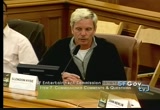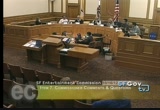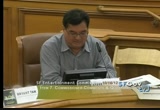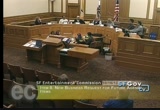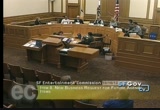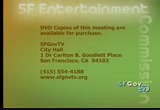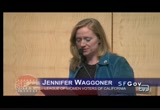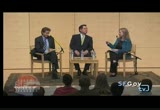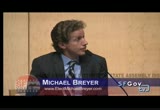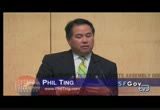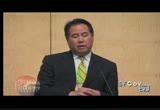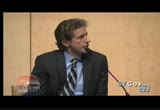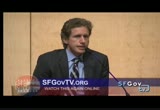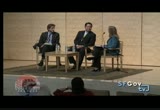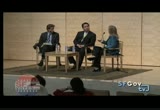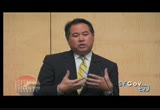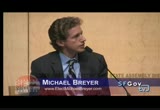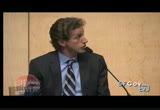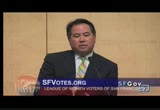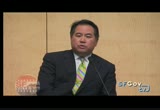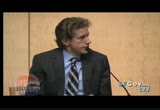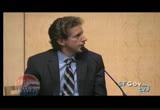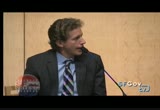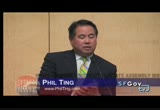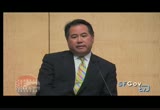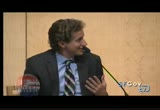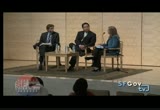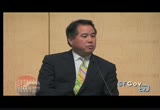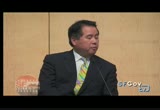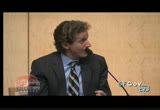tv [untitled] October 18, 2012 8:00am-8:30am PDT
8:00 am
having an open dialogue, and so we hope to move forward with that, and ask for help along the way. >> i have a question for jocelyn. so are we here november 6 or not because it's election day? >> well again that's a commission decision. at the staff level are open to canceling that meeting if the commission so desires. i think we kept appointments off calendar for the most part so it's fairly easy based on some concern about quorum in general on election day, so i don't know if that's something -- >> i was going to mention it too. i will be gone. i will be traveling so i will miss the two meetings -- if we have two meetings i will miss both in
8:01 am
november, definitely the second one, so as long as we're not backlogging permit applications i don't see a reason to have a meeting on election date. >> i think the commission's views is people do what they do on election day. >> do you want to make a motion then? >> yeah. i move to cancel the meeting on november 6 which is election day. >> all right. do we have a second? >> i will second it. >> all right. call the roll. >> yes. that's okay. any public comment -- >> wait. follow up on both of yours -- on glendon's thing. i walked broadway street on friday and i don't know maybe it was closed and there is still a lot of police presence there which is great, but seems like the crowd has changed a little bit.
8:02 am
it looks encouraging that broadway street -- in fact i talked to a couple of neighbors when i was inside one of the clubs and i think your christmas party and i think with the new commander we can get back on track and try to clean up broadway. i think it's manageable now. i think we're in a good state depending what happens to that property, the impala, and another follow up on the 29th of october. semac and california music and culture association is having a mixer with the supervisor candidates that are going to be elected november 6 and some of the current supervisors will be there. it's going to be at 6:00 o'clock at cafe denorde and everyone is invited to that.
8:03 am
29 of october in a couple of weeks. >> are we still voting? >> we voteed. >> you voted. >> but you have permits on then and the week of thanksgiving and don't let me down. >> any other comments by the commissioners? okay do we have public comment by the comments of the commissioners. seeing none the last item is new business and fiewrght agenda items. anyone want to request a future agenda item? >> i want to request that we hear from the sisters of perpetual indulgence and i dropped the email and i didn't send it and i want to reiterate they made improvements and it's important that we put that out there too and i would like to hear from them. their pink saturday was much better. >> very good. anybody else? >> is there any discussion on
8:04 am
halloween here. >> we don't do halloween anymore. >> okay. just curious. >> halloween weekend -- basically this weekend coming up and the weekend after are considered halloween weekend across the city. halloween at castro is not an event and therefore not acknowledging and not happening. it doesn't exist. >> okay. >> just one more thing. i'm sorry. the western soma plan is coming before planning for three meetings in november and heard at the board i believe the first week in december and i wanted to make people aware of that and we're also moving forward with the clear historic district. >> just one question. do you know if there have been changes to the south of market, not within 200 feet neighborhood, entertainment allowance thing. >> residential. >> yeah, residential buffer?
8:05 am
>> i think if there are concerns it's important to email them -- >> do you know if there have been changes? >> i don't know. i don't know what the changes would be. >> any public comment? seeing none that will conclude the october 16 entertainment commission meeting for the city and county of san francisco. thank you one and all. >> jennifer wagner. jnny first joined the league in san francisco in 2001 and has since volunteered in many roles at the local, regional and state and nation levels she currently volunteered as the president of the league of woman voters of california, and is a small business owner here in san francisco.
8:06 am
she holds a degree in government, from claire mont college and a policy. >> good evening, everyone, candidates. >> good evening. >> this year we have two candidates for state assembly state 19, michael brior and phil tim. >> they will answer questions that you in the audience submit as well as the questions submitted to the league of women voters. in addition, the viewers from the senior center may submit questions on-line. the time keepers will hold up a yellow card to signify to the candidates that they have 15 seconds remaining and hold up a red card when it is time to stop. >> both have asked the supporters to be respectful of the candidate and the audience and to maintain the quiet during the forum, i also ask you to respect this commitment, please. >> you all have many important decision to make on november
8:07 am
6th, and today's forum will give you the opportunity to ask questions to help you make your decisions. now, let's begin. >> our first question is a very general... actually i want to start with one here that is from the richmond senior center sent in on-line. >> the census data, and we are going to start with mr. brire >> data shows that many are adults with disabilities or seniors it is expected to grow to 25 percent by 2020, do you feel that you understand the needs and challenges of seniors and adults with disabilities in district 19? what do you think we worry about and how will you help us to stop worrying? >> so, absolutely, while i am a
8:08 am
young person, i do believe that we really have an obligation to protect our seniors. and when you see services to seniors being cut, you have to realize that they have contribute to the system their entire life and this is a time that they need services even more than other moments. and when you look at what is going on, you also have to say that there is the statistic that you gave is actually the start of the baby booming population, as she growing older. so we actually need more and more services, we need to actually have people trained to provide those services as well. and so, i think, of my great aunt, who is 94 years old, who is i speak to as much as i can, when i think about what the senior population is going through and really care about their children and their future as well. >> thank you, mr. bryer.
8:09 am
>> first off, thank you to the league of women voters and jr. voters for hosting this discussion tonight very glad to be here. i think of my grandmother and the amount of work that it took to take care of. we had an enormous amount of support from inhost services and i think about the california budget which has a $20,000 budget gap and the inhome services was one of those services that was cut where it was decided that we could not provide seniors care at home. instead, they are now going to the emergency room and seeking much more expensive healthcare. we need to do a whole list tick approach and cut back the safety net that we have been cutting. and we need to make sure that we honor or seniors by making sure that they are taken care of during their later years in life. >> so a related question starting you mr. ting. >> retirees are faced with
8:10 am
threats from their benefits from under funded pension funds what would you do to stop this from happening in the future and how do you make them live up to their obligations >> that is a great question, someone who is a fiscal question who has been working hard to make sure that the city and county of san francisco does everything possible to leave up responsibilities my office help to bring in above the budget due to the hard work of our office. pensions are a major issue not only in san francisco and the state. part of the work that we did last year where we worked with labor unions and unix to debate and discuss and dialogue and we found a pension proposal that we could bring forward to the voters in the city and county of san francisco which was passed and we know that that is not the final step that the first of many things that we are going to have to do to make sure that we have a balanced budget. the worst thing that we can do is to make sure that we need to make sure that pensions are going to be there for people
8:11 am
when they retire and we need to do everything possible to make sure that we live up to the obligations that we promised people when they started working. >> mr. bryer. >> pension is something that is critically important for the state. and we have huge obligations in the pension funds that have been unfunded and right now we are assuming something like a 7 and a half percent on pension returns when the private sector the returns are, you know, anticipated around 4 percent. and so this is an area where we have to be honest about how can we insure that people who have worked and who have contributed are going to have pensions in the future? and so, we really have to, approach i got very excited about was what i redid in san francisco, it is one of the reasons that i started the drafted campaign and he worked with the unions to really be
8:12 am
honest with how our system is going to be funded for not just in five years or ten years, but for the next generation. paramount importance. >> so expanding on that question, mr. bryer. >> what do you think can be done to address some of the systemic problem with the states' finances? >> we have to do a number of things. i mean, we literally are in a fiscal crisis. we have cities in the state going bankrupt. we have incredible challenges on our hands. and we have to increase revenue. we have to decrease costs. which are popular and which are a necessity. but most importantly we have to grow the economy. and so there are a host of host of measures in each of those areas that are absolutely critical for our future and they are not easy decisions to
8:13 am
be making but we have to make them sooner rather than later. because if you just pass the buck, it is the next generation who is going to be holding the bag. and in my mind, that is why i am running. it is really to look out for the children who are not voters, who are not being actually considered in my mind as much as they should. >> thank you. >> mr., chig how would you address the state's financial problems? >> we are about a hundred billion dollar budget here in california. we spent about a hundred billion and we bring in $80 billion revenue and that is a $20 billion budget gap, the fastest way for that is to grow jobs, we created clean, green collared jobs and brought jobs from overseas here into san francisco.
8:14 am
she is are models that we can take to continue to grow our economy. unfortunately that is not going to be enough. we have to also look at ways to raise revenue, that is why i am in support of our governor's tax measure because it brings critical funding to schools. that is why i am supportive of making sure that we are cleaning out and becoming more efficient through what i have done through office and to make government much more receptive and efficient. >> that leads into the question about civic engagement. it is critical that people are engaged to have a safe, strong and vibrant state. what have you done and what will you do to encourage the kind of participation that you are talking about. >> i think that transparency and disclosure are some of the main reasons that we have so little citizen participation, that is one of the reasons that i started up we stand san francisco it is an on-line society to engage citizen and order people to get more involved in government so that we cannot just have a
8:15 am
conversation here, where people could make it, if people could be part of that conversation on-line, just like all of the folks at the richmond senior sen center, so they can participate. i think that what is lacking in government at times is really making sur that citizens have the information, and they are digestable information and so few people when they pay property taxes one of the biggest checks they write every year, most people could never describe where the money goes. we have to make sure that we offer more transparency and more disclosure in giving the citizens more information to make the right decisions. >> thank you. >> mr. bryer what have you done and what would you do to encourage engagement? >> i started a big over ten years ago and really what it is about, it is about applying innovation or the first public wifi network in the world and we broadcast courtroom proceedings it is about transparently in government and education we. have over 70 law
8:16 am
schools and students who have unlimited access to this level. and so in large part, what we are trying to do, or what i have done, is tried to restore faith here in our government institutions by seeing how our court system works. your court system is not perfect, but when people see how our jury system actually works and learn about that, it is one step closer to again, reengaging a citizen in government. and we have to use technology, it is one of those credible tools that while people are disenfranchised in what is going on in sacramento with the lack of transparency, we can have a much more service-oriented government that reengages people. >> so speaking of service orientation, what do you think that the government should do? and where should the government step aside? >> in terms of... >> what do you think is the role of government? it is a very general question.
8:17 am
>> so, the role of government is to provide basic services that the private sector would just not provide. i mean, education, i mean, it is infrastructure, that means social services that means, giving people basic tools that they might not otherwise have. so really giving people in my mind an opportunity to succeed. and when the private sector, which can fall short in many areas are not providing, you know, basic services like food, or housing, or that is the role of government to step in. and we have to, we have to restore faith in our system of government. because if people do not believe that the government will spend money well, than it will not improve key infrastukt tur projects that the state needs to do. they need to invest in the roads because the
8:18 am
private sector is not. >> thank you. >> mr. king. how would you describe your views on the role of government? >> i think that the government provides some of the most critical services that we lie on every day, we walk on the sidewalk and get on a bus and drop our kids off at schools, many of the things that we take for granted. i wake up, i brush my teeth and water is there provided by our incredible water department. these are critical city service and state services that we rely on every day. the government has formed the back bone of our economy like the university of california which i am a proud graduate off. we have been able to grow the tech industry thanks to uc berkeley, and the bio tech thanks to uc sf and san diego. and we need to continue to invest in our future and investing in education and investing in uc, and making sure that those intaoutions are protected. i think that government needs to step out by making sure that we are not being overly
8:19 am
burdensome. i think that we make the citizen and businesses go to too many places at times. i think that there is a significant amount of bureaucracy that could be cut. >> you mentioned that education is one of the things that government has to be responsible for. >> california used to have a education system that was the envy of the system how do we get it back >> we get it back through funding it. from kindergarten to my time at uc berkeley, i just started dropping off my daughter at kindergarten this year and i am concerned about the state of public education. we fund our kids about $8,000 per pupil that feels like a lot of money, compare that to new york, new jersey, massachusetts, and you are talking anywhere between $14,000 to $15,000. almost double what california is. that is a tra vesty. i think that if you look at the fee increases for uc and higher education it is a absolute
8:20 am
crime that we are divesting in our future. we need to make sure that we invest in education. education is the way that we grow our economy. and it is the way that we grow our jobs and to make sure that we invest in all of the future. i was an investment. >> california invested in me and my education. >> mr. bryer, how do we get that great reputation back for great education. >> the first thing is that i agree that we have to fund our schools, first and foremost, that is not enough. we have to improve our school system and my grandfather actually one of the first people that i was told to originate the education code he would be turning over in his grave to see that it was 5,000 pages more than any other state, texas is next with 3,000. we have to have sacramento stop from tying up our schools from
8:21 am
making decisions and i think that we have to encourage good teachers and career paths and higher compensations because there are great, talented teachers. we have to have 100 percent transparency in budget and have the schools that are funded. funding so complicated that no one can explain it simply. we have to do a host of measurements. we have to tell students what they need to take in order, and what classes they need to take in order to qualify for your university, right now we are not doing that. parents should know that every child should have the right or opportunity to go to a four-year university. >> this is a question from the audience that is related. >> do you think that community colleges should focus mainly on practical things like training for unemployed workers and upgrading skills for new jobs? do you feel it is the states' role to encourage this? >> i certainly think that job training is a critical aspect
8:22 am
and obviously transferring to a four-year university as well and that is a great role. if you look at what is happening in city college in san francisco, it is a travesty. almost 85,000 students are being supported by something like 39 administrators. students were not collecting fees for the classes. they have no idea the cost of different campuses and how they operate. and so that is just a case study in how we have to be brave, we have to have people who are willing to be honest and plan ahead. in terms of having community college system which is not only you know, such a critical aspect of san francisco, and almost one in ten people is taking classes there, but is around and is not threatened by something has horiffic as losing their credentials which are being threatened.
8:23 am
>> i think that when governor pat brown designed the education, there were three rungs,. and they were absolutely integral. if you cut off one of those rungs you are cutting off a pathway for people to have a better life. if the community colleges don't offer courses where people can ma trick you late to csu or uc, i think that you are absolutely limiting their options. it is critical to do that. we have 90,000 students at the city college in san francisco. half of them are actually learning english as a second language because san francisco is an entry point for immigrants. and so, often we encourage immigrants to learn english and become citizens and without those courses at the city college they would not have those opportunities. so it is actually critical that we make sure that that institution is funded and that it is protected and that it is fiscally accountable. and we need to make sure that they are teaching classes like the solar class that i helped to advocate for. we now have classes at the campus to learn how to install
8:24 am
solar on people's roofs because of the great system that we have here in san francisco. >> you touched on the immigrant community and this is a question from the audience. governor brown vetoed both the trust act and the domestic workers bill last week, how did you feel about those pieces of legislation. >> i was disappointed. i mean one of the issues that we have debated here in san francisco was directly when to turn, over, juveniles to immigration officials and i have taken the position that, again, they are innocence until proven guilt y so that here in san francisco which is the position of the city that we should not be turning over innocent juveniles to immigration officials regardless of the potential situation. i think that domestic workers, unfortunately, are in a very challenging situation, i know personally that we have an in-home support services person come and help and work with us to help take care of my
8:25 am
grandmother. this person was part of our family and this person was someone who was actually crit tal to maintaining her health. but in a work environment, you need to make sure that the rules are clear. so that legislation, tried to create rules in a work environment for some information and they had protection and they could have breaks and they could have all of the protections that we have when we go to work. >> i think this we are a country that is founded on immigrants and i think that actually my ancestors, many people in the audience have been and they came from around the world and across the world. started in new lifes themselves. so, i just support completely the important role that immigrants have and i think that clearly, that there should be a path to citizenship and that there should be a great respect in many ways for all of
8:26 am
the things that they do. >> state proposition, 35, asks if the definition of human trafficking should be expanded and the penalties for the traffickers be increased and be registered for sex offenders and training be provided for law enforcement officers. i am curious, what is your position on this? >> i support that. i think that obviously, trafficking is a horrific occurrence that happens in areas around the world and it is something that we certainly should have a very strong stand on. and so i think that we absolutely should support that proposition completely. >> thank you. >> mr. chang?mr. king.
8:27 am
>> that was one of the issues that we worked on, many of the women who are in san francisco get trafficked from asia and so this is something that is a very serious issue that we need to take it and create greater enforcement and we have received a time and worked with non-profits in a coalition to make sure that the city and the law enforcement and the da and the local police department actually took much more greater, aggressiveness towards this issue, twiet often, this is happening in your neighborhood, this is happening down the street from your office, this is not something that is happening in some other part of the world. this is happening in san francisco. and it is extremely unfortunate that we have not done everything possible to stamp it out. >> thank you. >> so we are on the last question now. and we are going back to the richmond senior center who is joining us virtually and they asked very specifically, funding cuts to senior programs and services for adults with disabilities are an unyoual reality. many programs may seize to
8:28 am
exist without the help from the state level. how will you advocate for us. >> i would ask the seniors at the richmond senior center to not just depend on me but really find ways that we can all work together which is really the question of going back to citizen engagement. unfortunately the people with the smallest voices in sacramento got cut the last couple of years and those were kids and seniors those were the ones that took the bulk of the cuts. and so there is only a couple of ways to go. and which we can find more revenue to get $20 billion that we can get and get great jobs and we have to go and raise revenue tha, is why prop 38 and the governor's proposal is actually critical to our budget and i think that we have to look at ways that we can cut expenses that are not seniors. i don't think that most people know that our correction budget is $9 billion, and contrast that to our usc which is $10 billion. >> i think that those two
8:29 am
priorities should be funded the same. >> thank you. >> i would add to that, that we can't just point out that the present system is costing us $9 billion or more than higher ed. but we have to be willing to reform the system and to find ways to save costs. and when you look at an example of the initiative that is three strikes and you are out. that could save a tremendous amount of money. $47,000 a year to keep someone in prison rather than what we are spending on year for education whereas someone is educated and having a job there they are not going to go to jail, it is very unlikely. so i would say that there might be something like determinive sentencing which would allow someone who is drug addiction and you could provide the judge with
121 Views
IN COLLECTIONS
SFGTV: San Francisco Government Television Television Archive
Television Archive  Television Archive News Search Service
Television Archive News Search Service 
Uploaded by TV Archive on

 Live Music Archive
Live Music Archive Librivox Free Audio
Librivox Free Audio Metropolitan Museum
Metropolitan Museum Cleveland Museum of Art
Cleveland Museum of Art Internet Arcade
Internet Arcade Console Living Room
Console Living Room Books to Borrow
Books to Borrow Open Library
Open Library TV News
TV News Understanding 9/11
Understanding 9/11